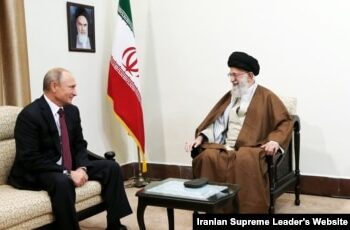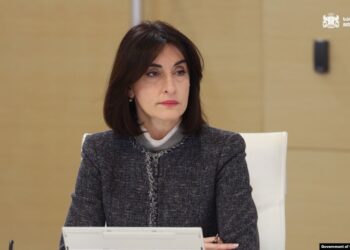It’s been a busy week for international diplomacy in Europe as allies discuss the war in Ukraine, the Israel-Hamas conflict and oil market stability.
Oil-producing giants Russia and Saudi Arabia met in Moscow Wednesday to discuss the oil market situation amid the ongoing violence and geopolitical uncertainty between Israel and the Palestinian militant group Hamas.
The Kremlin warned Wednesday that the Israel-Hamas conflict has the hallmarks of a “hot war” right now and could potentially be “very dangerous,” especially on a humanitarian level.
Meanwhile, Ukraine’s President Volodymyr Zelensky was in Belgium Wednesday meeting the NATO defense minister and other allies in an attempt to bolster support and military assistance for Kyiv ahead of winter.
The meeting comes amid signs of flagging support for continuing military aid Ukraine as the war drags into to its 19th month. The war between Israel and Palestinian militant group Hamas is also a distraction for Western leaders hoping to avoid a wider and more destabilizing Middle Eastern conflict.
Putin: Russia is on the right track
Russian President Vladimir Putin said Moscow “is on the right track” in a speech given during Russian Energy Week, as reported by state media outlet TASS on Telegram.
Putin said that it “goes without saying” that Western attempts to isolate Russia have failed, and that people around the world no longer want to tolerate the “colonial thinking [that] persists in the West.”
Zelensky urges support for victims of Israel terror attacks
Ukrainian President Volodymyr Zelensky urged the international community to support the people who were harmed during the Saturday terrorist offensive of Palestinian militant group Hamas against Israel.
The Ukrainian premier spoke at a press briefing during his first visit to the Brussels headquarters of the NATO military alliance since Russia’s full-scale invasion of Kyiv. He attended to request defense aid and weapons to tide Ukraine over during another challenging wartime winter.
“We are at war, so we understand what such terrorist attacks mean,” he said Wednesday. Zelensky called for international solidarity with Israel following the attacks. The NATO coalition has likewise condemned the Hamas assault.
The Kremlin has meanwhile placed blame on a failure of US foreign policy for the latest spate of hostilities in the Middle East, Reuters reports.
“I remember the first days of our full-scale war. It began from terrorist attacks from Belarus, by missile, then the Russian army entering. The biggest tragedy we had was so many dying people. It was very important not to be alone,” Zelensky said.
“My recommendation to the leaders [is] to go to Israel, to support people. I’m not speaking about institutions, just to support the people who have been hit by these terrorist attacks,” he stressed, adding, “Unity is more important than being alone.”
Vladimir Putin issues fresh nuclear threat
President Vladimir Putin said on Thursday that Russia had successfully tested a potent new strategic missile, and declined to rule out the possibility it could carry out weapons tests involving nuclear explosions for the first time in more than three decades.
Putin said that Moscow had successfully tested the Burevestnik, a nuclear-powered and nuclear-capable cruise missile with a potential range of many thousands of miles.
In his words, “if any country launches a nuclear attack against Moscow, no single enemy would have a chance of survival”.
The United States and its allies were no longer sufficiently afraid of Russia’s nuclear might, said Sergei A. Karaganov, whose commentary is often influential in the Kremlin. “Isn’t it time,” he asked the Russian leader, “to lower the threshold and go firmly but quickly up the escalation ladder to deter and sober up our partners?”
Putin, who a year ago was issuing nuclear threats of his own, said he was familiar with Mr. Karaganov’s proposals, which include hitting “a bunch of targets,” with nuclear strikes, but the Russian leader said he saw no need to alter the country’s current nuclear doctrine.
He is also feeling more confident on the battlefield in Ukraine, regularly bragging about Ukraine’s stalled counteroffensive, lessening the need to rely on nuclear threats. Polls show that despite support for the war in Ukraine, Russians broadly disapprove of the possible use of nuclear weapons.
Two killed in strike on Ukrainian school
A Russian missile this week hit a school in central Ukraine, killing at least two people, officials said.
Rescuers were still searching for survivors under the rubble in the town of Nikopol in Dnipropetrovsk, regional governor Serhiy Lysak said.
“It has been established that the victims were employees,” Ihor Klymenko, the interior minister, said on Telegram, alongside footage of rescue workers clambering through the rubble of the school.
The governor said more than 40 homes and an infrastructure facility had been damaged in the attack, and that two men aged 24 and 71 had been wounded.
Russia did not immediately comment on the incident, then denied deliberately targeting civilians, although many have been killed in frequent Russian air strikes across Ukraine since the invasion.
Two Ukrainian brothers accused of helping Moscow in cafe attack that killed 55
Two Ukrainian villagers have been accused of helping guide a missile strike that killed dozens of people in the Ukrainian village of Hroza.
The strike on October 5 saw a Russian missile slam into a cafe in the village in Kharkiv as people gathered to mourn a fallen Ukrainian soldier.
It was the deadliest attack in Ukraine this year, and one of the worst since Russia invaded, with Ukrainian prosecutors putting the death toll at 55.
The Security Service of Ukraine (SBU) said the two suspects, who are brothers, worked for the Russian occupation authorities when Moscow controlled the village for several months last year.
The SBU said the men fled to Russia shortly before Ukraine regained control of the village in September last year. After this, the agency said the men continued to work for Russia by building a network of informants in Ukraine.
According to the SBU, the brothers started gathering information on the wake in Hroza at the beginning of October.
“Under the guise of friendly conversations and correspondence in Messenger, the traitors asked people for information about the deployment of the defense forces and mass events in the region,” the SBU said.
Compiled by Ana Dumbadze














